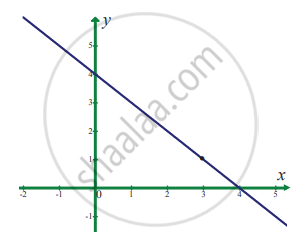Advertisements
Advertisements
प्रश्न
Evaluate the following limits:
`lim_(x -> oo) 3/(x - 2) - (2x + 11)/(x^2 + x - 6)`
उत्तर
`lim_(x -> oo) 3/(x - 2) - (2x + 11)/(x^2 + x - 6) = lim_(x -> oo) (3/(x - 2) - (2x + 11)/((x + 3)(x - 2)))`
= `lim_(x -> oo) (3(x + 3) - (2x + 11))/((x + 3)(x - 2))`
= `lim_(x -> oo) (3x + 9 - 2x - 11)/((x + 3)(x - 2))`
= `lim_(x -> oo) (x - 2)/((x + 3)(x - 2))`
= `lim_(x -> oo) 1/(x + 3)`
= `1/oo`
`lim_(x -> oo) 3/(x - 2) - (2x + 11)/(x^2 + x - 6)` = 0
APPEARS IN
संबंधित प्रश्न
In the following example, given ∈ > 0, find a δ > 0 such that whenever, |x – a| < δ, we must have |f(x) – l| < ∈.
`lim_(x -> 2)(2x + 3)` = 7
Evaluate the following :
Given that 7x ≤ f(x) ≤ 3x2 – 6 for all x. Determine the value of `lim_(x -> 3) "f"(x)`
In problems 1 – 6, using the table estimate the value of the limit
`lim_(x -> 0) (cos x - 1)/x`
| x | – 0.1 | – 0.01 | – 0.001 | 0.0001 | 0.01 | 0.1 |
| f(x) | 0.04995 | 0.0049999 | 0.0004999 | – 0.0004999 | – 0.004999 | – 0.04995 |
In exercise problems 7 – 15, use the graph to find the limits (if it exists). If the limit does not exist, explain why?
`lim_(x -> 3) (4 - x)`
Sketch the graph of a function f that satisfies the given value:
f(0) is undefined
`lim_(x -> 0) f(x)` = 4
f(2) = 6
`lim_(x -> 2) f(x)` = 3
Write a brief description of the meaning of the notation `lim_(x -> 8) f(x)` = 25
If f(2) = 4, can you conclude anything about the limit of f(x) as x approaches 2?
Evaluate the following limits:
`lim_(x -> oo) (x^4 - 5x)/(x^2 - 3x + 1)`
Evaluate the following limits:
`lim_(x -> oo)(1 + 1/x)^(7x)`
Evaluate the following limits:
`lim_(x -> oo) (1 + 3/x)^(x + 2)`
Evaluate the following limits:
`lim_(x -> 0) (sqrt(x^2 + "a"^2) - "a")/(sqrt(x^2 + "b"^2) - "b")`
Evaluate the following limits:
`lim_(x -> 0) (sqrt(1 + sinx) - sqrt(1 - sinx))/tanx`
Evaluate the following limits:
`lim_(x -> oo) ((x^2 - 2x + 1)/(x^2 -4x + 2))^x`
Choose the correct alternative:
`lim_(x - pi/2) (2x - pi)/cos x`
Choose the correct alternative:
`lim_(x - oo) sqrt(x^2 - 1)/(2x + 1)` =
Choose the correct alternative:
If `f(x) = x(- 1)^([1/x])`, x ≤ 0, then the value of `lim_(x -> 0) f(x)` is equal to
`lim_(x -> 0) ((2 + x)^5 - 2)/((2 + x)^3 - 2)` = ______.
`lim_(x -> 0) (sin 4x + sin 2x)/(sin5x - sin3x)` = ______.
If `lim_(x -> 1) (x + x^2 + x^3|+ .... + x^n - n)/(x - 1)` = 820, (n ∈ N) then the value of n is equal to ______.
`lim_(x→∞)((x + 7)/(x + 2))^(x + 4)` is ______.
